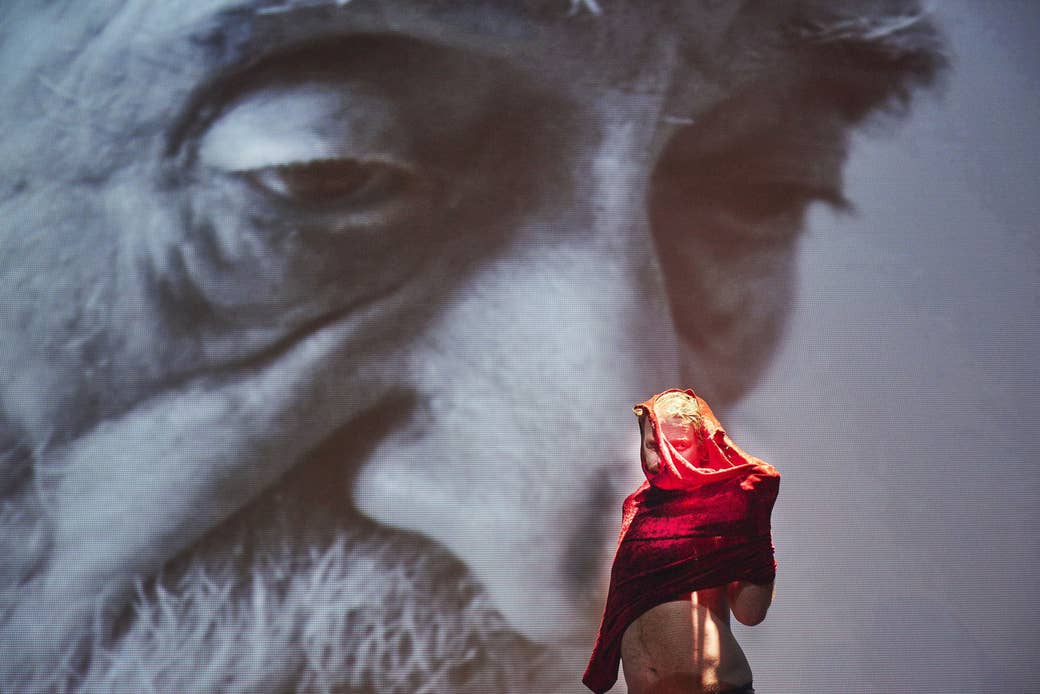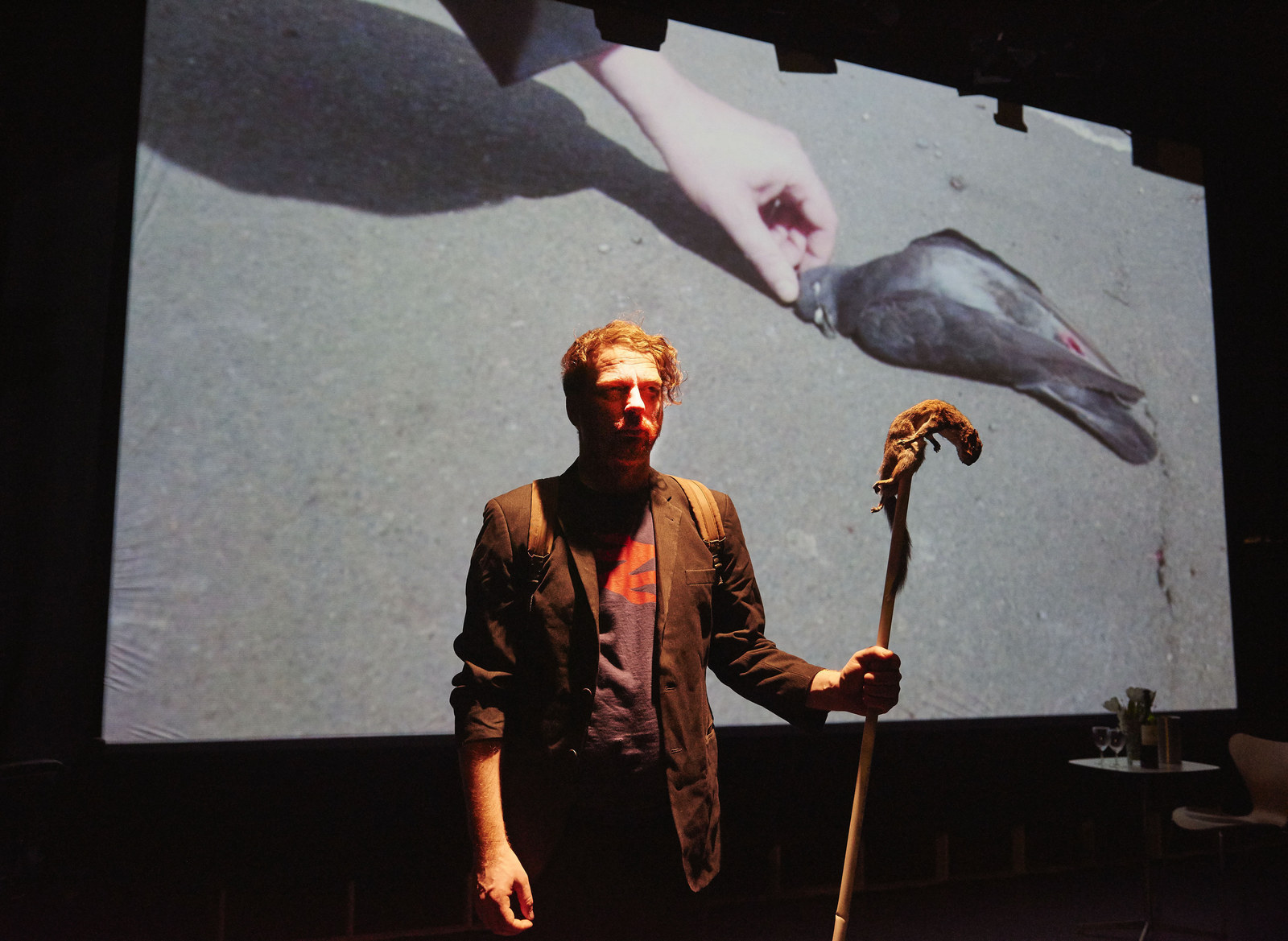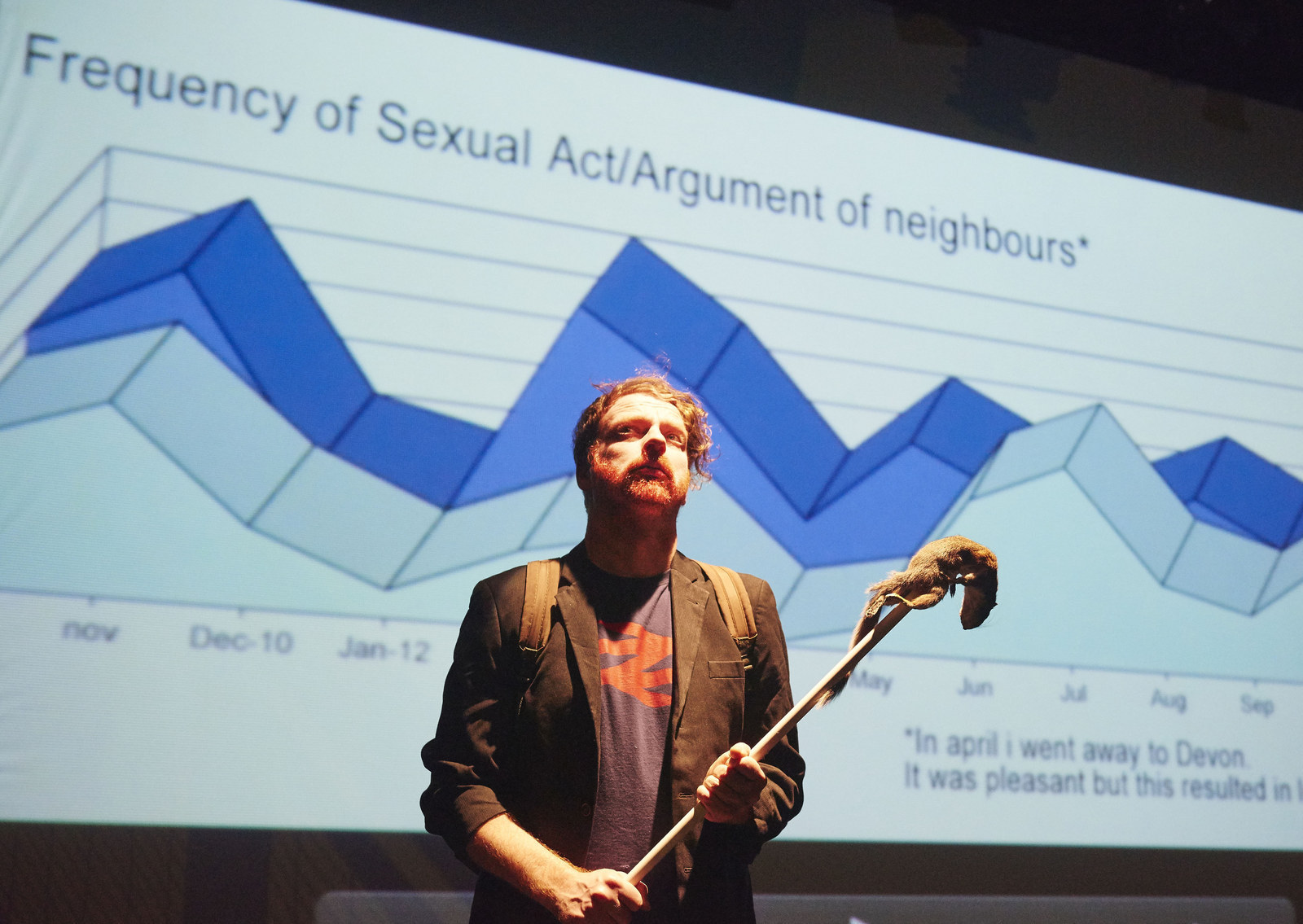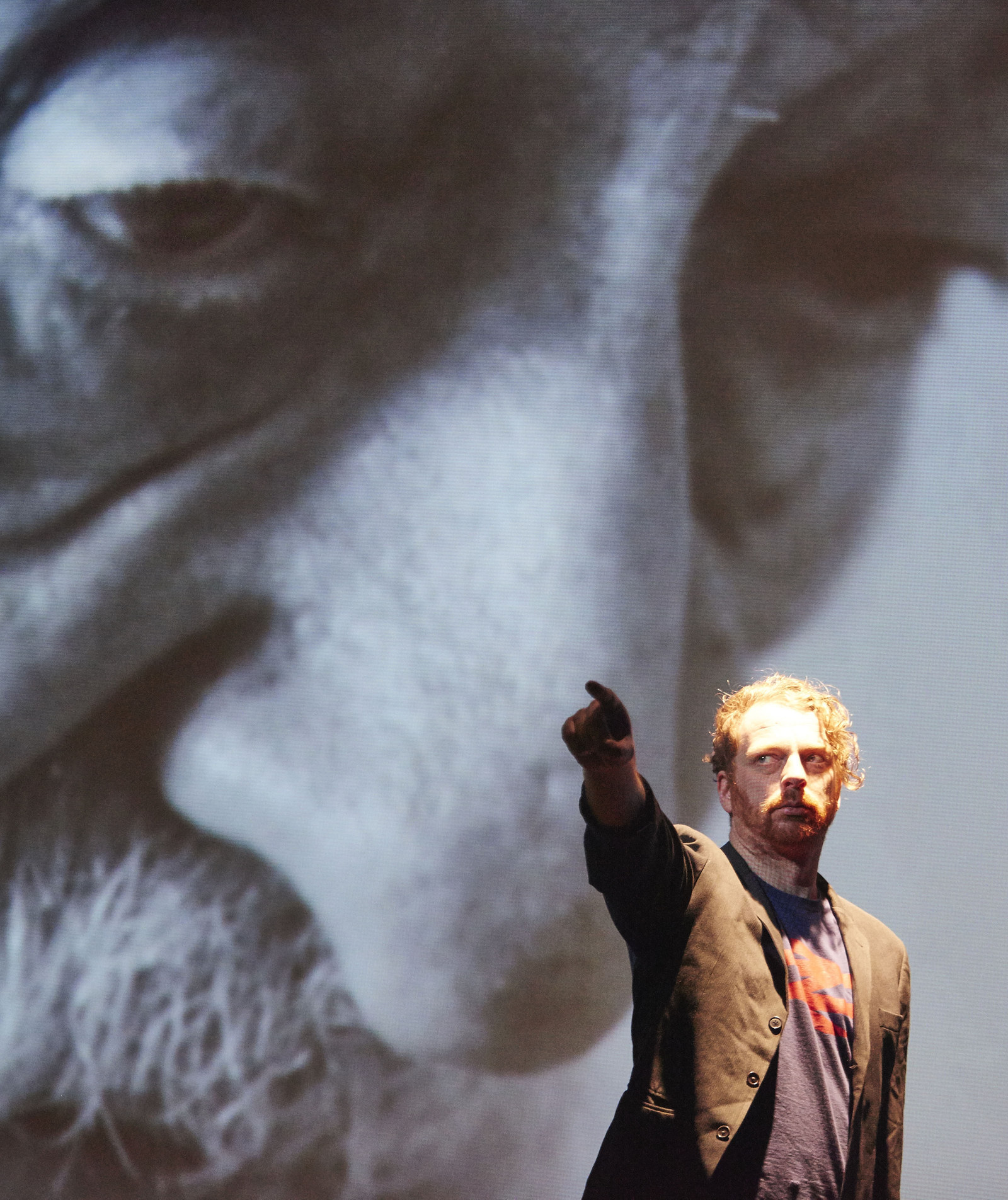Kim Noble is both clinically depressed and currently sans therapist, which, as situations go, is not a great one.
His most recent therapist quit the profession entirely – broke up with him during the session, and then, as far as Kim can tell, disappeared off the planet. Vanished. His therapist before that died. He collapses in peals of laughter in a booth in the bar of the Soho Theatre, where his show You're Not Alone is back for a five-week run. And so do I. You can’t help it. Kim’s laugh is infectious.
She died.
“I have a thing about endings too,” he said, “which made that last one all the more difficult.”

In a 2009 solo show called Kim Noble Will Die, Kim told the audience that unless anyone met him on Waterloo Bridge at 4am on a specific date the following month, he would throw himself into the Thames. Then, in an unprecedented move, people in London actually gave a shit. They not only remembered the date for longer than the wait for the night bus home, they planned their lives around it and waited for him on a bridge, in the middle of the night, four weeks later.
They waited for a guy they didn’t even know.
It makes sense though. Kim’s shows are ostensibly about depression, life and death and the murky places in between – but there’s an overriding yearning for a connection, any connection, however real, fake, or engineered in those bizarre ways that only Kim Noble can.
Like on a bridge at dawn.
The English philosopher Simon Critchley wrote in his book Notes on Suicide that suicide notes are a last and desperate attempt at communication. The writer is always speaking to someone in a suicide note; they don’t exist in a vacuum. “The suicidal person does not want to die alone," he said, "but wants to die with another or others, to whom the note is addressed.” Noble’s shows are, in a way, suicide notes from a man who, right now, seems relatively fine.
I mean, he seems fine. He can’t stop laughing. Listening back to my interview tape we sound stoned as hell. It was 3:30pm. We weren’t even drinking. In the days following, I decided this is the absolute worst kind of thing to transcribe. Just staring at a screen, waiting for two people to stop laughing about wanting to die.
“I was in a bad place when I put that show together. Things kept going wrong. Ooh–” he says, rolling his eyes, “–look at me, poor little white middle-class artist, wanker, twat.” He waves his hand, as if pushing aside the bullshit his own brain has served up. “But that show was made from a genuine place of I don’t want to be alive any more.”
It wasn’t a new feeling. He remembers telling his mum, during a debilitatingly unhappy summer holiday when he was 11, that he wanted to die. Kim Noble Will Die came a few years after his mental breakdown of 2004, which resulted in a friend having him hospitalised. He still did bits of performing while he was ill – he had parts in The Mighty Boosh, and Garth Marenghi’s Darkplace – but his Perrier Award-winning comedy partnership with Stuart Silver dissolved.
This wasn’t his usual brand of depression.
“I knew I was depressed, but it didn’t get any better. It just got worse and worse. Things happened – getting kicked out of a house, career going downhill, big relationship ending – and I just couldn’t cope with it. So I started to plan dying.
"I was quite accepting, I just thought that was a good way out.”

When I ask what he was like before the breakdown versus now, Kim can’t say how different he is, he is just fundamentally changed. “I think, for a lot of people, it’s not just about a breakdown. Depression is just part and parcel of everyday life. But for me it was such a defining moment.”
He’s come off meds once or twice, but it’s never worked out. When I do the mental maths and ask Kim if that means he’s been on medication for about 10 years, he says “Shit,” and looks around the theatre bar to see if anyone’s overheard. Then he says, conspiratorially: “I’m actually quite normal.” I point out that I’ve seen his shows, that I’ve seen him fuck a watermelon on a screen 18 feet wide. He cradles his head in his hands and giggles.
The longstanding cliché of the “crazy artist” comes up a lot when you talk to artists about being crazy, unsurprisingly. More often than not, it turns out to be bullshit. Kim found it incredibly hard to work while under the fog of depression. His creativity was not, as the cliché goes, dependent on his mental instability. Medication pulled him out of it just enough to be on an even keel, to be able to think. It didn’t turn him into another person, it didn’t dull him down or squash his creativity, it just enabled him to function.
“Medication was brilliant,” he says. “Sleeping tablets and The Simpsons and Adam & Joe podcasts pretty much got me through. I just became obsessed by audio books. And then I became more angry. I started filming. That’s when I started using my camera. Filming me, filming anything, trying to make sense of it.”
Kim’s shows – the one with the bridge, and the one that followed, You're Not Alone – are a mixture of video and live performance. The hundreds of hours of tape he collected were arranged into coherent pieces of theatre only after he became well again (sort of). They are a brief window into the many strange and involved projects Kim has going on at any given time.

He doesn’t know why he does what he does – pretending to be an employee at B&Q in a homemade outfit, pretending to be a woman on the internet for lonely men, all of these things that make up his shows. “Partly it’s my work, my art,” he says. “Partly it’s just something to do. When I’m not doing it I’m even more depressed or even more not sure. By filming those things – or making them into a blog, or a piece of work on stage, or a short film, or whatever – it kind of justifies my life somehow.”
His are the kind of shows that sound terrible if you explain them; a sliver of conversation about his current show ends with the words: "But the dog penis doesn't actually enter the man's anus."
You can tell your friends that You're Not Alone is about loneliness, or his relationship with his elderly father, and maybe even the internet. But never try to explain why he handed out phials of semen in one show, or how he makes a vagina out of two chicken breasts in another. They will not come with you. Just tell them that his shows somehow break your heart and weird you out and make you fall in love with a strange ginger bloke standing there, naked, but for a slightly bloodied codpiece made out of gaffer tape.
Kim’s shows don’t end, they just mutate.
Kim Noble Will Die was only supposed to run for two or three days as part of an arts festival, and then he was going to die. That was the plan.
“At that point there was a genuine idea that this could happen. I didn’t know if I’d be alive next month,” he said. “I’d take my medication on stage at the end of the night and say, ‘This is how I stay alive and I don’t know how long I’m going to be here for.’”
Soho Theatre’s associate director Nina Steiger is quick to point out that Kim’s shows are not documentary, and shouldn’t be confused as such. As his Wikipedia entry still states, “He remains alive.” He remains on stage, talking about something other than suicide. Life interfered and changed his perfect, finite, front-page news Waterloo Bridge finale. By the time the night on the bridge came around, Kim was in a relationship with a woman who had become pregnant, and then miscarried a week before. What had started out as a show about wanting to kill himself ended up being about the things he would leave behind if he did, and how, right now, he might not want to.

Kim took home all 10 people who met him that night, in taxis he had waiting. Back at his house, he talked them through the new ending, one by one, 10 minutes each, in front of an installation about the baby who never arrived.
He seems embarrassed now that he was so sure people would turn up that he actually pre-ordered some taxis, but there’s something to be said for this level of hopefulness in a man who had otherwise lost all hope. There's also an argument, put forward by Critchley in Notes on Suicide, that suicide is the last move of an optimist – someone who believes that this one thing could solve it all. A pessimist would think it’s all fucked no matter what you do.
Does mental illness define him?
“Are you allowed to say disabled now?" he replies. "I’m so not PC. I sometimes do feel like that – that’s when I think it defines me, and when I have to be careful. But everyone here is kind of depressed,” he says, his sweeping hand taking in the whole bar. “I’m just lucky enough to be able to talk to people and get on stage and masturbate about it.”
I ask him if the hospitalisation helped, if therapy has done any good. He says he doesn’t think therapy has helped him get better, but it’s kept him alive.
“I’ve used it at those times when I’ve been really bad. I think it’s helped me at those times to not do anything stupid.” He backtracks. “Not ‘stupid’. I hate that word, I don’t mean that. I don’t think it is stupid.”
I ask him if he still thinks about killing himself.
“Not every day,” he says. “And not necessarily about killing myself. I think I don’t want to be alive, not the actual harsh act of taking my life. But not at the moment.”
At times like this, when there are shows coming up and interviews like this one, and during the show’s run when there are shows to do, Noble’s spirits are up. He’s communicating with people. After, in the quiet, it’s more difficult.
“I’m sure I’ll feel like that after the show ends, in January and February. But we’ll cross that bridge when we come to it,” he says. “Or jump off it.”
We’re laughing again.
A few hours after our interview, which took place a week after the Paris bombings, Kim sent me an email. He said he felt the interview was a bit trite, “a bit too me me me”. He said that with all the other shit that was going down right now, why were we discussing his little life?
“I did the show in Europe over the weekend and something obviously felt different, people wanted to be together. It wasn't about me. I didn't say that tonight. But suddenly lying here I wanted to email that.
That's all.”
Kim Noble's You're Not Alone runs 3 December–9 January at Soho Theatre, London.


